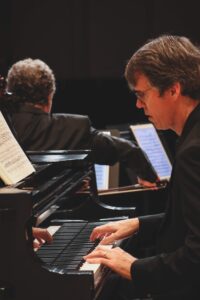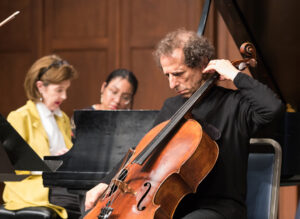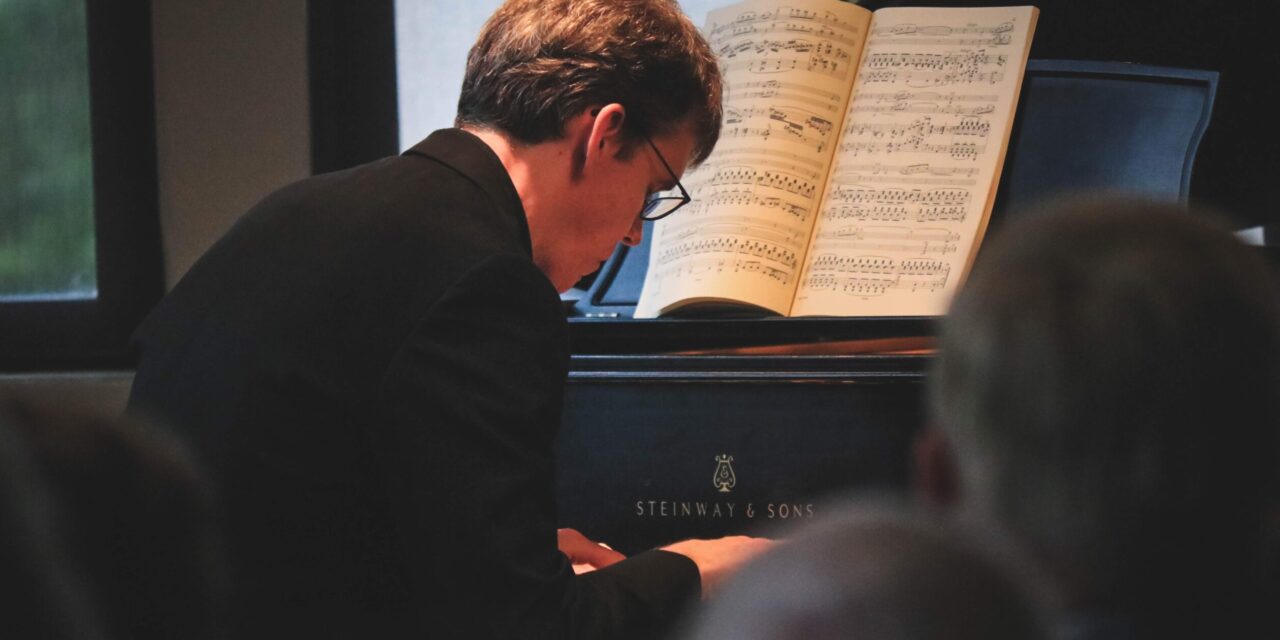This preview has been provided as part of a publicity exchange between CVNC and East Carolina University’s Four Seasons Chamber Festival. To learn more about CVNC’s publicity exchanges and advertising opportunities, please follow this link.
Don’t miss remarkable musical pairings in March!
One of Four Seasons’ most unique traits is the fact that most concerts feature never-before-seen ensembles. Sure, the individual musicians may have graced Four Seasons’ stages before, but the overall configuration is usually a novel one.
Every now and again, however, we are treated to something quite the opposite: a pairing of musicians so tried and so true that the resulting music is nothing short of magical. East Carolina University’s Four Seasons Chamber Music Festival’s next Signature Series concert, Muses & Inspirations, features one such pairing.

Thomas Sauer, piano, and Colin Carr, cello. Photo by ECU Four Seasons.

Colin Carr, cello. Photo by Willow Mercando
Pianist Thomas Sauer and cellist Colin Carr have been performing together for decades. It’s a musical partnership that has taken them to concert stages in New York City, London, and Boston, among others, and together they’ve recorded the complete cello and piano works of both Felix Mendelssohn and Ludwig van Beethoven. What a treat, then, it will be for Four Seasons audiences to hear firsthand the fruits of their labor when Colin and Tom bring the program to a close with Beethoven’s monumental Third Cello Sonata!
Muses & Inspirations is also an event that also features different combinations of musicians. Violist (and Four Seasons founder & artistic director) Ara Gregorian and Tom – who have a fruitful years-long partnership in its own right – will open the program with a performance of Rebecca Clarke’s powerful Sonata for Viola and Piano, and all three musicians will join forces for Johannes Brahms’s Trio in A Minor, Op. 114.
Program Note: Rebecca Clarke’s Sonata for Viola and Piano
by Henry Michaels
The rules for Elizabeth Sprague Coolidge’s 1919 composition competition were simple enough: each entry had to be a suite or sonata for viola and piano, it couldn’t have yet been published or performed, and it had to be submitted anonymously. The anonymity part was important as it would ensure a fair and impartial judging of the submissions, and to preserve it each composer was instructed to enclose their real name and address in an envelope marked with either a nom de plume or a chiffre (French for cipher). After a first cut (narrowing 73 pieces down to 10) and then a second, two pieces remained for the judges to review – one a suite for viola and piano, the other a sonata. Only the winning composer’s name was to have been revealed to the judges and the world, with the other name forever remaining a mystery. There was just one problem. Elizabeth Sprague Coolidge had arranged for an even six judges, and the vote for the winning piece was tied.
First the judges inquired about leaving the result a tie, but Coolidge wasn’t keen on the idea of splitting the $1,000 prize money. The judges voted again, but the count remained three votes apiece. In the end, Coolidge herself was forced to cast the deciding vote, and the winning composer’s envelope was torn open to reveal the name…Ernest Bloch. The judges were curious about the other composer’s name, though (at least one judge is said to have been sure that the second envelope would contain the name Maurice Ravel). Shouldn’t they open it, too, they wondered, especially since the results were this close?
English composer and violist Rebecca Clarke had worked on her Sonata for Viola and Piano throughout the spring and summer of 1919 in the hopes of submitting it to a competition sponsored by Elizabeth Sprague Coolidge, a powerful art patron with whom she was acquainted. She finished the sonata over the summer and dropped it in the mail on July 11, writing in her diary, “I put in final marks on my Sonata, & sent it off. Can hardly believe I really have got it done.” She was happy with her work. After a read-through with friends just a few days earlier, she wrote, “Expected to hate it after all that work, but really am rather pleased with it.”
The name in the second envelope was, of course, Rebecca Clarke’s. The moment the judges read it must have been a dramatic one; Clarke would later write that Coolidge told her, “You should have seen their faces when they saw it was by a woman!” The dramatic moment was also a defining one in the career of Rebecca Clarke, who ended up being treated more as co-winner than runner-up. Although she didn’t receive any monetary prize, she was pleasantly surprised to find that Coolidge planned to feature her Viola Sonata at the same festival as Bloch’s winning work. Its premiere received high praise. There was also much discussion in musical circles and the press of Clarke’s near win, with some news outlets even relating the story that one judge had thought the piece to have been written by Ravel.
Small details can sometimes have enormous impacts. That was certainly true of Coolidge’s seemingly inconsequential decision to engage six judges for her 1919 competition, a decision that ultimately led to the dramatic Bloch-Clarke tie. The highly public second-place finish was a defining moment for Rebecca Clarke, who was as skilled a promoter as she was a composer and violist. In the years that followed, she got the sonata published by a major publisher, performed it on three continents, and used its popularity to boost awareness of her other music. It remains a beloved mainstay of the repertoire to this day. And as for Elizabeth Sprague Coolidge, she never again used an even number of judges for a competition!
Event Information
Greenville – Fri, Mar 15 @ 7:30 PM (click for event info)
A.J. Fletcher Recital Hall
Raleigh – Sun, Mar 17 @ 3:00 PM (click for event info)
Hayes Barton United Methodist Church
PROGRAM:
Rebecca Clarke – Sonata for Viola and Piano
Johannes Brahms – Trio in A Minor, Op. 114
brief pause
Ludwig van Beethoven – Sonata for Cello and Piano No. 3 in A Major, Op. 69
This residency and the Greenville concert are generously sponsored by David & Sydney Womack. The Raleigh concert is generously sponsored by David & Judy Fruend.











